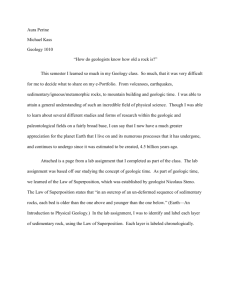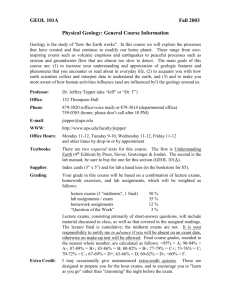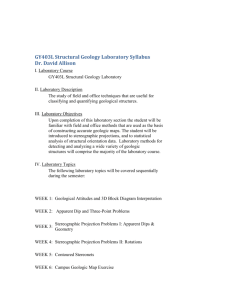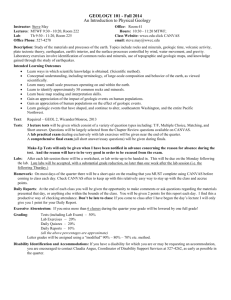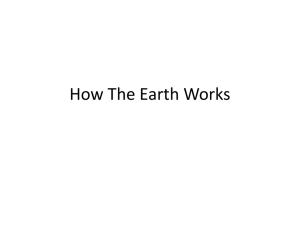January 8 No lab - DePaul University
advertisement
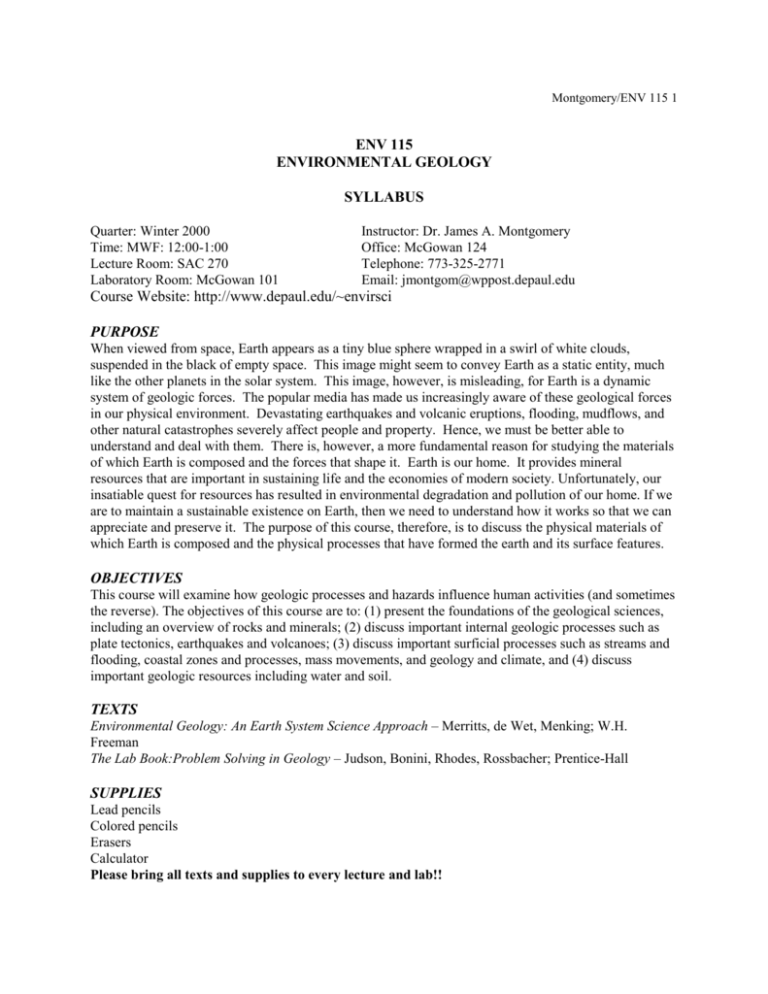
Montgomery/ENV 115 1 ENV 115 ENVIRONMENTAL GEOLOGY SYLLABUS Quarter: Winter 2000 Time: MWF: 12:00-1:00 Lecture Room: SAC 270 Laboratory Room: McGowan 101 Instructor: Dr. James A. Montgomery Office: McGowan 124 Telephone: 773-325-2771 Email: jmontgom@wppost.depaul.edu Course Website: http://www.depaul.edu/~envirsci PURPOSE When viewed from space, Earth appears as a tiny blue sphere wrapped in a swirl of white clouds, suspended in the black of empty space. This image might seem to convey Earth as a static entity, much like the other planets in the solar system. This image, however, is misleading, for Earth is a dynamic system of geologic forces. The popular media has made us increasingly aware of these geological forces in our physical environment. Devastating earthquakes and volcanic eruptions, flooding, mudflows, and other natural catastrophes severely affect people and property. Hence, we must be better able to understand and deal with them. There is, however, a more fundamental reason for studying the materials of which Earth is composed and the forces that shape it. Earth is our home. It provides mineral resources that are important in sustaining life and the economies of modern society. Unfortunately, our insatiable quest for resources has resulted in environmental degradation and pollution of our home. If we are to maintain a sustainable existence on Earth, then we need to understand how it works so that we can appreciate and preserve it. The purpose of this course, therefore, is to discuss the physical materials of which Earth is composed and the physical processes that have formed the earth and its surface features. OBJECTIVES This course will examine how geologic processes and hazards influence human activities (and sometimes the reverse). The objectives of this course are to: (1) present the foundations of the geological sciences, including an overview of rocks and minerals; (2) discuss important internal geologic processes such as plate tectonics, earthquakes and volcanoes; (3) discuss important surficial processes such as streams and flooding, coastal zones and processes, mass movements, and geology and climate, and (4) discuss important geologic resources including water and soil. TEXTS Environmental Geology: An Earth System Science Approach – Merritts, de Wet, Menking; W.H. Freeman The Lab Book:Problem Solving in Geology – Judson, Bonini, Rhodes, Rossbacher; Prentice-Hall SUPPLIES Lead pencils Colored pencils Erasers Calculator Please bring all texts and supplies to every lecture and lab!! Montgomery/ENV 115 2 COURSE EXPECTATIONS Lectures: Lectures are MWF from 12:00-1:00 p.m. Read the assigned material before the lecture. You are responsible for all material covered in lecture. Examinations: Examinations will consist of true-false, multiple choice, short answer, quantitative, and essay questions. Exam questions will come from the lecture notes, textbook, lab manual, and any assigned readings. Lecture objectives and definitions will be posted as Learning Goals on the website. The Learning Goals effectively serve as exam study guides. Exams 2 and 3 are cumulative in nature. Homework Assignments: Homework assignments will consist of questions and exercises from your textbook, lab manual, and outside sources. You have one week to complete the assignments. Assignments are due in my office by 5:00 p.m. on the due date. The due date for each assignment is given at the top of each assignment. NO LATE ASSIGNMENTS WILL BE ACCEPTED! Laboratories: Labs will begin on time (Monday-1:10 p.m.; Wednesday, 1:10 p.m.). Read the assigned material before the lab. You are responsible for all material covered in lab. In most cases lab assignments and activities will be due at the end of the lab period. NO LATE LABS WILL BE ACCEPTED. NO MAKE-UP LABS WILL BE GIVEN, except for situations that involve a medical emergency or death in the family. Verification will be requested. Please contact me about absences as soon as possible. You can expect to spend the full three hours in lab. To ensure that you have read the material, a 10-point pre-lab quiz will be given at the beginning of each lab period. If you come to lab late, you will not be given the pre-lab quiz. Attendance Policy: Class begins promptly at 12:00 p.m. I do not appreciate students coming in late to class, as it is disruptive. I will begin taking attendance the week of January 15. Students missing more than three lectures will have up to five points deducted from their final course average. Academic Integrity: According to the DePaul University Student Handbook, “Violations of academic integrity include, but are not limited to, the following categories: cheating, plagiarism, fabrication, falsification or sabotage of research data, destruction or misuse of the university’s academic resources, alteration or falsification of academic records, and academic misconduct.” The Handbook also states that “[f]aculty members … have the authority and the responsibility to make the initial judgement regarding violations of academic integrity in the context of the course that they teach. They may impose sanctions up to and including failure of a course at their own discretion in cases involving a violation of academic integrity policies.” For more information, see the Student Handbook online at http://www.depaul.edu/~handbook. Montgomery/ENV 115 3 LABORATORY SCHEDULE Week of January 8 January 15 January 22 January 29 February 5 February 12 February 19 February 26 March 5 March 12 Exercise in The Lab Book: No lab Rock-Forming Minerals (Part V – pp. 195-210) Igneous Rocks (Part V – pp. 211-218) Sedimentary Rocks (Part V – 219-224); Metamorphic Rocks (Part V – pp. 225-228) Topographic Maps (Part II – pp. 7-21); Air Photos (Part II- pp. 25-28) Geologic Maps, Structures, and Earth History (Part II - pp. 37-53) Streams (Part III – pp. 85-95); Glaciation (Part III – pp.116-124) Ground Water (Part III – pp.99-110); Landslides (Part III – pp. 69-82) Earthquakes and Seismic Risks (Part IV – pp. 143-151); Plate Movements (Part IV – pp. 175-190) Volcanoes and Volcanic Hazards (Part IV – pp. 153-166); Earthquakes, Volcanoes, and Plate Tectonics (Part IV – pp. 169-174) GRADING Your grade will be based on the following distributions of work and percentages: 3 examinations @ 20% each Laboratory assignments Homework assignments (60%) (25%) (15%) Course grades will be assigned according to the following scale: 92 90-91 87-89 82-86 A AB+ B 79-81 76-78 71-75 68-70 BC+ C C- 65-67 D+ 60-64 D <60 F EXTRA CREDIT ACTIVITY – HOMESITE EVALUATION You can earn up to 50 points by conducting a Homesite Evaluation. Details of this evaluation are found on the website. Extra credit points will be added to the total number of points you have accrued on your laboratory assignments. Montgomery/ENV 115 4 COURSE TOPICS (in approximate order of coverage) Environmental Geology and Environmental Problems Earth System Science Rocks and Minerals Maps Plate Tectonics Landslides Water Resources Streams and Floods Water Quality Coastal Erosion Energy OFFICE HOURS MWF: 11:00-12:00; Friday: 1:00-5:00 p.m.

